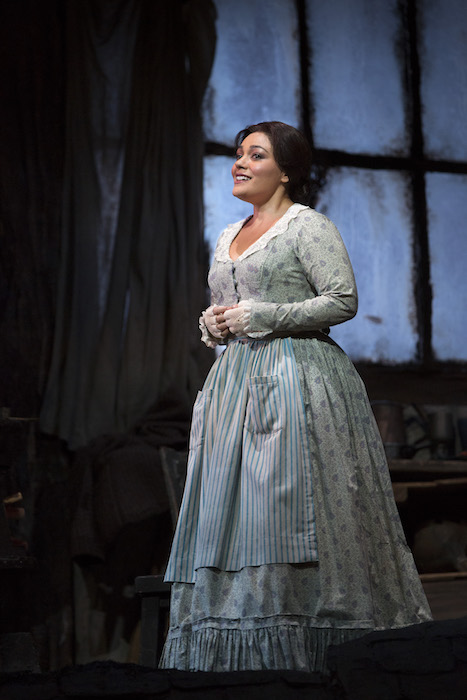Met’s cast deux makes for a fresh and involving “Bohème”

Ailyn Pérez is Mimi is the new cast of Puccini’s “La Bohème” at the Metropolitan Opera. Photo: Marty Sohl
The Metropolitan Opera’s run of Puccini’s La Bohème reached the beginning of its end Thursday night with the first performance of its new cast. This lineup, with soprano Ailyn Pérez as Mimi and tenor Michael Fabiano as Rodolfo will finish the opera’s season.
With the new singers, the polished revival of the Franco Zeffirelli production has developed into an expressive and affecting one. Much of the credit goes to the new cast, but conductor James Gaffigan and the MET orchestra also bear substantial responsibility.
Pérez’s singing captured the role musically and dramatically: the notes were there, and so was the feeling of a young woman finding love along the slow path to her death. She sang Puccini like it was Verdi, her performance of “Si, mi chiamano Mimi” was marvelous, full of the kind of subtle and detailed variations in articulation and dynamics that make for a great musical performance.
Her Mimi was full of warmth in Acts I and II, while in the latter acts Pérez’s voice had a stainless-steel shine—clear and resonant while still smooth and flexible, making Mimi’s demise far more moving than usual.
Fabiano sang with a youthful innocence, fervor, and tenderness. As with Pérez, his performance was a real characterization. “Che gelida manina” had a naïve sincerity, and in the Act III ensembles he added a palpable weight of feeling, so much so that in the final Act one could feel Rodolfo’s happy-go-lucky character had really matured. His attentive solicitousness to Mimi and devastated reaction at her death felt real and genuine.
The whole production has grown warmer and more natural since its opening in September. Thursday night it felt natural and fully lived-in, with an easy confidence and relaxed concentration.
Previously, Gaffigan and the singers were precisely synchronized in a way that emphasized detail but which bogged down in Act IV, as if so fascinated with each current moment that they could not stitch each together into a long, uninterrupted line.
Now, the coordination is not as scrupulously precise but is more musical and meaningful, more of a dialogue between singers and orchestra. While the final act felt even slower than before, there was a much clearer shape and a forward motion that covered more ground and made it far more involving. Standing in sharp and powerful contrast, was the musical and dramatic execution of the final scene, each character’s actions defined with such clarity that they stacked on top of one another, like a complex chord.
Except for Angel Blue’s winning Musetta, the entire leading cast was new. The whole ensemble of men was excellent, and more than singing they were clearly having fun in the roles, especially their staged interaction. Baritone Lucas Meacham sang Marcello and immediately stood out for the simple, clear elegance of his phrasing and rhythm, which was pleasing in its own right and a fine complement to his counterparts, Fabiano and Blue.
Baritone Duncan Rock had a grounded vivaciousness as Schaunard, and bass-baritone Christian Van Horn sang with a gravity that added great charm to the comical Colline—his brief Act IV aria, saying goodbye to the coat he’s about to pawn, was one of the musical highlights of the evening.
La Bohème in general, and this production in particular, is about as familiar as opera gets, but this fresh and dramatically involving staging deserves attention.
La Bohème runs through December 13. metopera.org; 212-362-2000


